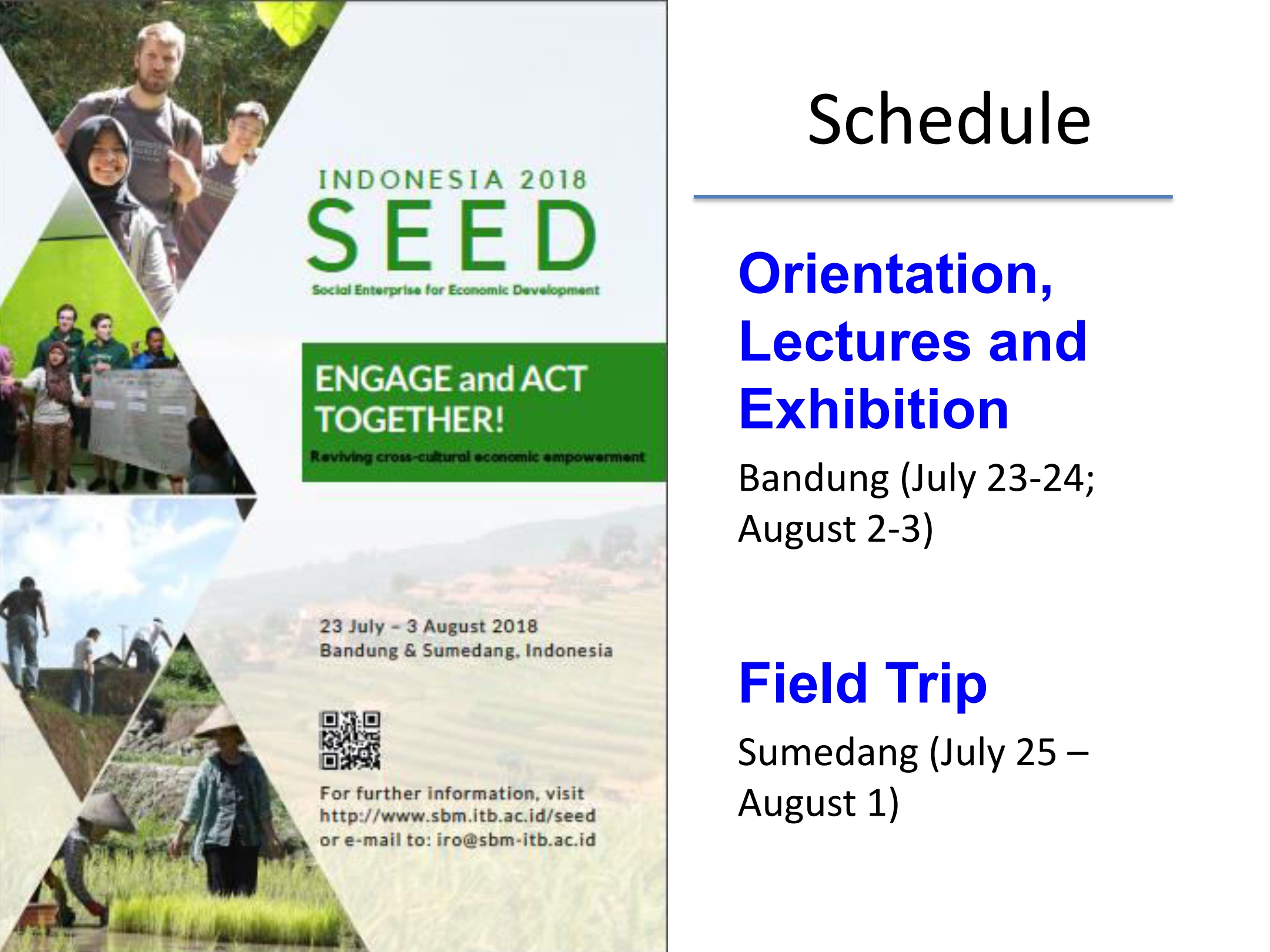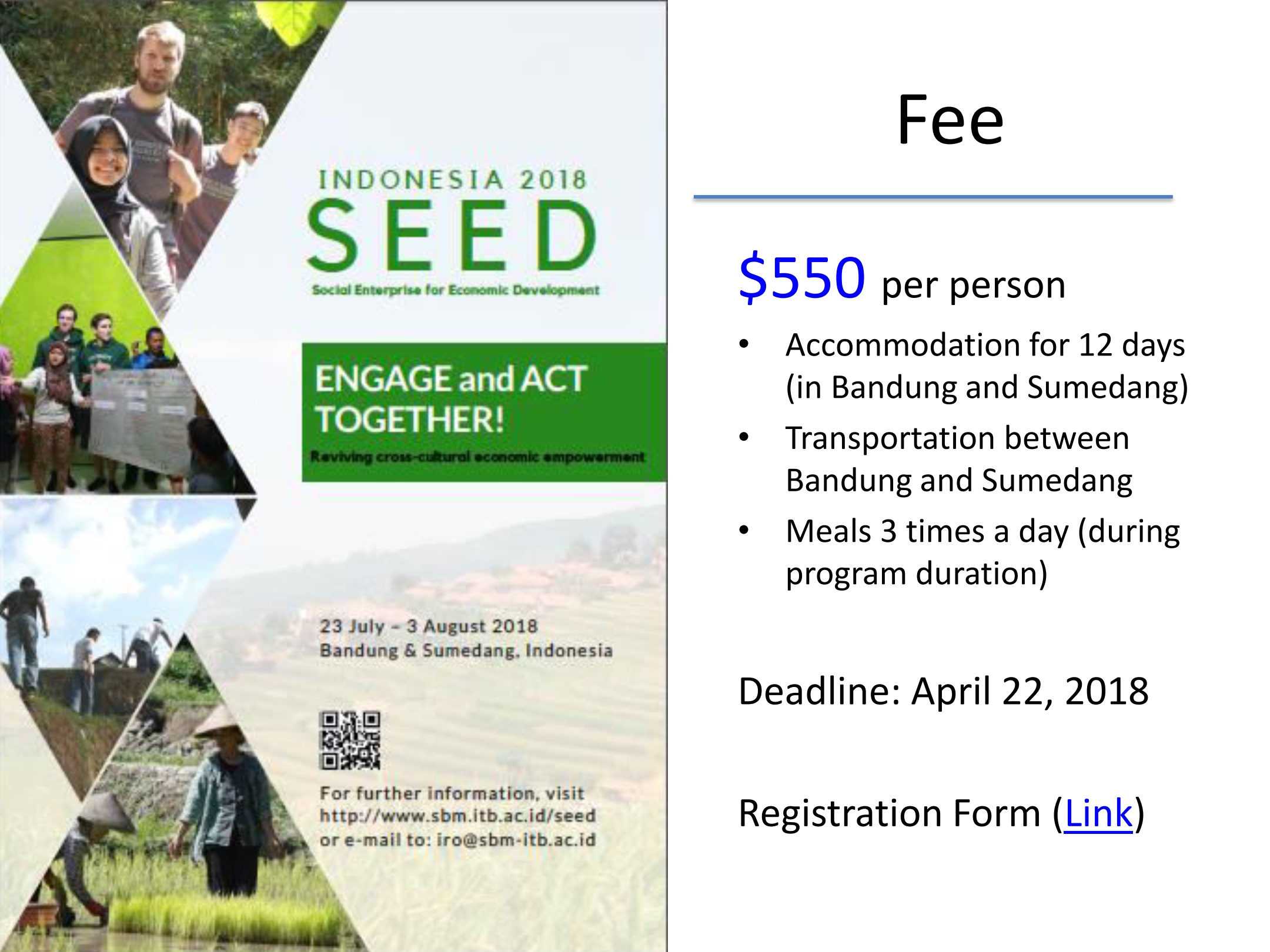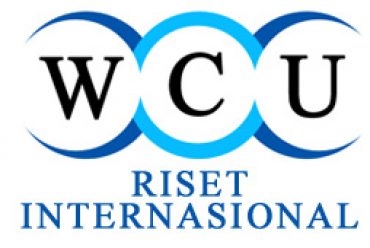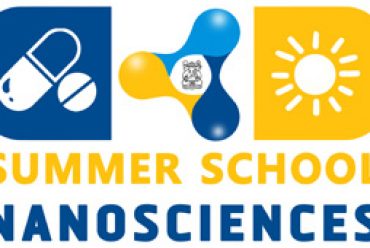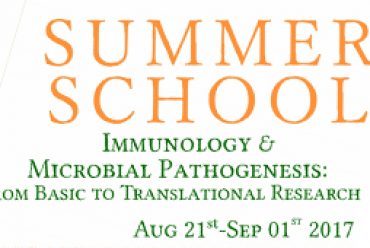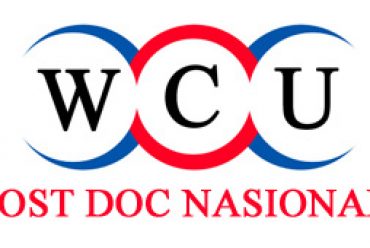Social Enterprise for Economic Development – SEED
INTRODUCTION
Cultural understanding in the study of management becomes increasingly important when the world activity becomes borderless. This condition encourages the study of management to develop new capabilities that can accommodate activities involving individuals whose different cultural backgrounds. Inspired by this urgency, School of Business and Management – ITB and Asia Research Center – University of St. Gallen, Switzerland created a cross-cultural learning program in which students can learn in real terms to work together in teams that have different cultural backgrounds, called Social Enterprise for Economic Development (SEED) program. The hope is that they will gain practical knowledge about how to work within such multicultural team.
On the other hand, answering the increasing demand for social responsibility to the community, SEED program is directed into a community development program in which students are challenged to assist rural communities to develop themselves. Through this program students are expected to hone social awareness and social responsibility to the community.
This workshop, organized by the ASEAN Learning Network, aims to discuss cross-cultural learning program in the SEED program with experts and academics from Indonesian universities as an effort to enrich and to develop the context-based management studies.
Overview of Social Enterprise for Economic Development (SEED) Program
Social Enterprise for Economic Development (SEED) Program is a two weeks cross-cultural management learning program which is a result of collaboration between universities in South East Asia incorporated in the ASEAN Learning Network. Unlike other learning programs, SEED program offers learning activities through real experiences in a contextual manner in which the participants will learn to understand how to manage differences in cultural backgrounds that exist within multi-cultural organization.
This program is followed by students from different universities from different countries in Southeast Asia and Europe. They work together to conduct a study on the economic potentials of a community and develop business plans that can support the community development. Through this program, the participants have two cross-cultural learning process, namely among fellow participants and the community. Background differences that exist among the participants who come from different cultures and countries encourage them to understand the culture for each student to work with each other. Cultural differences that exist between student participants and the local community also encourage learning for both students and local communities. To achieve these purposes, the participants live together in the middle of the community, learn their culture, life, habits, customs and local traditions.
The understanding of the characteristics of these communities is needed to recognize the economic and social potential possessed by the community in an effort to develop a business that can support the advancement of the community. Social enterprise or social enterprise is the key in understanding how economic development occurs. Developed business plan aims to build community-owned economic activities, conducted by the community, and for the advancement of the community. This is done to encourage economic development level in the region with hope in future the community can develop themselves to be economically more independent.
ASEAN Learning Network and SEED Program
School of Business & Management, Institut Teknologi Bandung (SBM ITB) as the fastest growing business school and part of ITB as one of the centre of academic excellence in Indonesia recognizes the importance of inter-cultural approach to the studies of management and economic. In cooperation with the Asia Research Centre at University of St. Gallen (ARC-HSG) “the top business school in Europe and number one in the German-speaking world” to promote the importance of cultural-based management studies and contribute this development to the society, on February 10, 2009, the ASEAN Learning Network (ALN) was established in Bandung, an organization that aims to attain practice-relevant academic excellence in a socially responsible way for participating institutions through culture-based management and economic research, teaching and practice-training. To achieve this vision, it develops culture-based research, training and practice-training projects and programs to equip students who will be socially responsible and culturally competent in the evolving context of Asia.
Until now ALN members consists of School of Business and Management – ITB (Indonesia), Universiti Malaysia Kelantan (Malaysia), Ho Chi Minh City Banking University (Vietnam), Prince Songkla University (Thailand), University of Brunei Darussalam (Brunei), San Beda College (Philippines), De La Salle Collage (Philiphines), Parahyangan University (Indonesia), Thaksin University (Thailand), Universiti Malaysia Perlis (Malaysia), Universiti Teknologi Malaysia (Malaysia), Princess of Naradhiwas University (Thailand) and currently working to expand the network to other ASEAN countries. ALN apparently interested in the activities of SEED program and makes it one of its activities.
SEED Program in Indonesia from School of Business and Management Institut Teknologi Bandung
Seed 1 was conducted in Cisondari, Ciwidey, Bandung regency, West Java, with a concentration on cooperation among students with different backgrounds to jointly develop the community in Ciwidey. The method used is a social mapping. In the implementation of the visible presence of cooperative relationships between students of different backgrounds so that the acculturation of science among students from obvious. Methodology of process participants (students) see the economic potential there that led to programs that still draws on the knowledge of students, such as river tourism (rafting) which is not based on an existing access to the community. While other businesses are trying developed as industrial yogurt, forest honey industry, and organic agriculture is not supported by public knowledge so that knowledge of the business is only a handful of people and sustain. This is because students only see the economic potential in the community. But the process of acculturation among students does happen a good relationship and exchange of knowledge to be positive, but there is no significance to the development of society.
Seed 2 still in cisondari or Ciwidey, try to apply in terms of society that is focused on mapping the social customs of the elements that have become everyday access performed as making caramel and other products that already exist. The problem is there is no institution that tries to continue a program that has been initiated by the student seed, opernah endeavored to involve an Indonesian who happened to be in the area, but no roads because of the Indonesia program is different.
Seed 3 seed program synergized with community services program courses are held in Ciwidey, and social orientation mapping concentrated to small businesses that have been pumped initiated by college students participating in community services, as one example Etawa milk business. Then participants seed to give input to this effort Etawa milk, but the program does not spread to other people in the village because of the nature of the people competing so hope to disseminate knowledge to the rest of society is not achieved. The issue then is the culture that must be known apart from socio-economic conditions of society
Seed 4 conducted in Garut on a cooperative, participants provide input for the development of cooperatives and also provide training to the board koprasi. Besides the implementation of the seed also done to cisondari to evaluate the previous program (3 seed). The issue that stands out is no group that monitors the seed program that has been done so that the targeted deployment of managerial knowledge is not passed on to other members of society.
Seed 5 held in Pangalengan and monitoring in Ciwidey. In this particular program in canning seed attached to the program ICSD (Indonesia Center for Sustainable Development)institutions that have projects in the region as well as the activities of community college services. Seed programs in the region can be said to have a major impact for the community. As for the students themselves did occur acculturation knowledge of economics and management, but many requests to add in terms of fun (recreation) so that intercultural issues in a group of participants to be seen again.
Seed 6 held in Pangalengan seeing the success of community development in the area but in terms of the relationship between the participants is less recreational activities, the seed here plus an element of recreation. The issue of culture, especially the cultural value has been overcome with the college students research community service and also of institutions ICSD. So that participation in the program here is quite large seeds such as playing football, participate in the activities of pieces of cattle because of the feast of Eid al-Adha.
Seed 7 was still in Pangalengan and concentration on the development of small entrepreneurship in the industrial sector, as well as monitoring of the activities of the previous seed.
ENROLLED NOW
DOWNLOAD OUR BROCHURE

